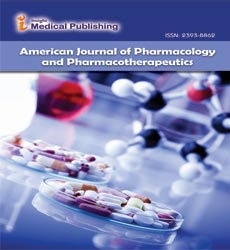ISSN : 2393-8862
American Journal of Pharmacology and Pharmacotherapeutics
Clinical Applications of Pharmacogenomics in Personalized Medicine
Antonia Rong*
Department of Clinical Pharmacology, University of Barcelona, Bellaterra, Spain
- *Corresponding Author:
- Antonia Rong
Department of Clinical Pharmacology, University of Barcelona, Bellaterra,
Spain,
E-mail: rong@gmail.com
Received date: May 29, 2024, Manuscript No. IPAPP-24-19307; Editor assigned date: May 31, 2024, PreQC No. IPAPP-24-19307 (PQ); Reviewed date: June14, 2024, QC No. IPAPP-24-19307; Revised date: June 21, 2024, Manuscript No. IPAPP-24-19307 (R); Published date: June 28, 2024, DOI: 10.36648/2393-8862.11.2.180
Citation: Rong A (2024) Clinical Applications of Pharmacogenomics in Personalized Medicine. Am J Pharmacol Pharmacother Vol.11 No.2:180.
Description
Clinical pharmacology is a multidisciplinary field that integrates pharmacology, pharmacokinetics, and therapeutics to optimize drug therapy for individual patients. It plays a crucial role in understanding how drugs interact with the human body, guiding healthcare professionals in prescribing medications safely and effectively. This comprehensive review explores the principles, applications, and advancements in clinical pharmacology, emphasizing its pivotal role in modern healthcare. This branch focuses on how drugs exert their effects on the body. It involves studying drug-receptor interactions, signal transduction pathways, and the relationship between drug concentration and response. Understanding pharmacodynamics helps predict therapeutic efficacy and potential side effects. Pharmacokinetics deals with the Absorption, Distribution, Metabolism, and Excretion (ADME) of drugs. It quantifies how drugs move through the body, including factors influencing drug bioavailability and half-life. Pharmacokinetic principles guide dosing regimens to achieve desired therapeutic outcomes. The study of drug metabolism involves enzymatic processes that convert drugs into metabolites, which may be inactive or active. Genetic variations in drug-metabolizing enzymes influence individual responses to medications, highlighting the importance of personalized medicine in clinical practice. Understanding drug-drug interactions is crucial to avoid adverse effects or therapeutic failure. Pharmacologists assess potential interactions based on pharmacokinetic and pharmacodynamic properties, guiding safe prescribing practices.
Neurological disorders
Clinical pharmacologists evaluate drug toxicity and adverse effects, monitoring for signs of overdose or cumulative toxicity. Toxicological assessments inform risk-benefit analyses and patient safety considerations. In cardiology, clinical pharmacologists manage medications like beta-blockers, calcium channel blockers, and anticoagulants. They optimize drug combinations and dosages based on individual patient profiles, aiming to prevent cardiovascular events while minimizing side effects. Oncology pharmacologists specialize in chemotherapy agents and targeted therapies. They assess drug efficacy through pharmacokinetic monitoring and pharmacogenomic testing, tailoring treatments to patient-specific factors like tumor type and genetic makeup. Neuropharmacologists study medications for neurological disorders such as epilepsy, Parkinson's disease, and depression. They evaluate drug mechanisms of action in the Central Nervous System (CNS) and monitor therapeutic drug levels to optimize symptom control and patient outcomes. Infectious disease pharmacologists manage antimicrobial therapies for bacterial, viral, fungal, and parasitic infections. They conduct susceptibility testing to ensure effective antibiotic dosing and combat antimicrobial resistance. Pediatric clinical pharmacologists specialize in drug therapies for children, considering age-related pharmacokinetic differences and safety profiles. They develop pediatric dosing guidelines and conduct clinical trials to evaluate drug efficacy and safety in pediatric populations. Incorporating pharmacogenomics allows clinicians to tailor drug therapy based on individual genetic profiles, improving treatment outcomes and minimizing adverse reactions. Big data and computational tools aid in drug discovery, pharmacokinetic modeling, and predictive analytics, facilitating personalized medicine approaches.
Pharmacodynamic
Enhanced methodologies like mass spectrometry enable precise measurement of drug concentrations in patient samples, optimizing therapeutic regimens in real-time. Digital Health Technologies Wearable devices and telemedicine platforms support remote monitoring of patient responses to medications, enhancing medication adherence and therapeutic outcomes. Rising antimicrobial resistance necessitates innovative strategies for developing new antibiotics and preserving existing therapies. Ensuring the safety of new medications through rigorous clinical trials and post-marketing surveillance remains a priority. Healthcare in access to personalized medicine and pharmacogenomic testing highlight the need for equitable healthcare delivery. The future of clinical pharmacology lies in leveraging interdisciplinary collaborations, advancing pharmacogenomic insights, and integrating digital innovations to optimize drug therapy. By embracing these opportunities, clinical pharmacologists continue to play a pivotal role in advancing patient care and therapeutic outcomes across diverse medical specialties. Clinical pharmacology is essential in translating scientific knowledge into personalized patient care. By applying pharmacokinetic and pharmacodynamic principles, clinical pharmacologists optimize drug therapy efficacy, safety, and adherence. Advances in precision medicine, digital health technologies, and pharmacogenomics promise to further enhance the field's impact, fostering individualized treatment approaches tailored to patient-specific needs. As healthcare evolves, clinical pharmacology remains integral to achieving optimal therapeutic outcomes and improving global public health.
Open Access Journals
- Aquaculture & Veterinary Science
- Chemistry & Chemical Sciences
- Clinical Sciences
- Engineering
- General Science
- Genetics & Molecular Biology
- Health Care & Nursing
- Immunology & Microbiology
- Materials Science
- Mathematics & Physics
- Medical Sciences
- Neurology & Psychiatry
- Oncology & Cancer Science
- Pharmaceutical Sciences
